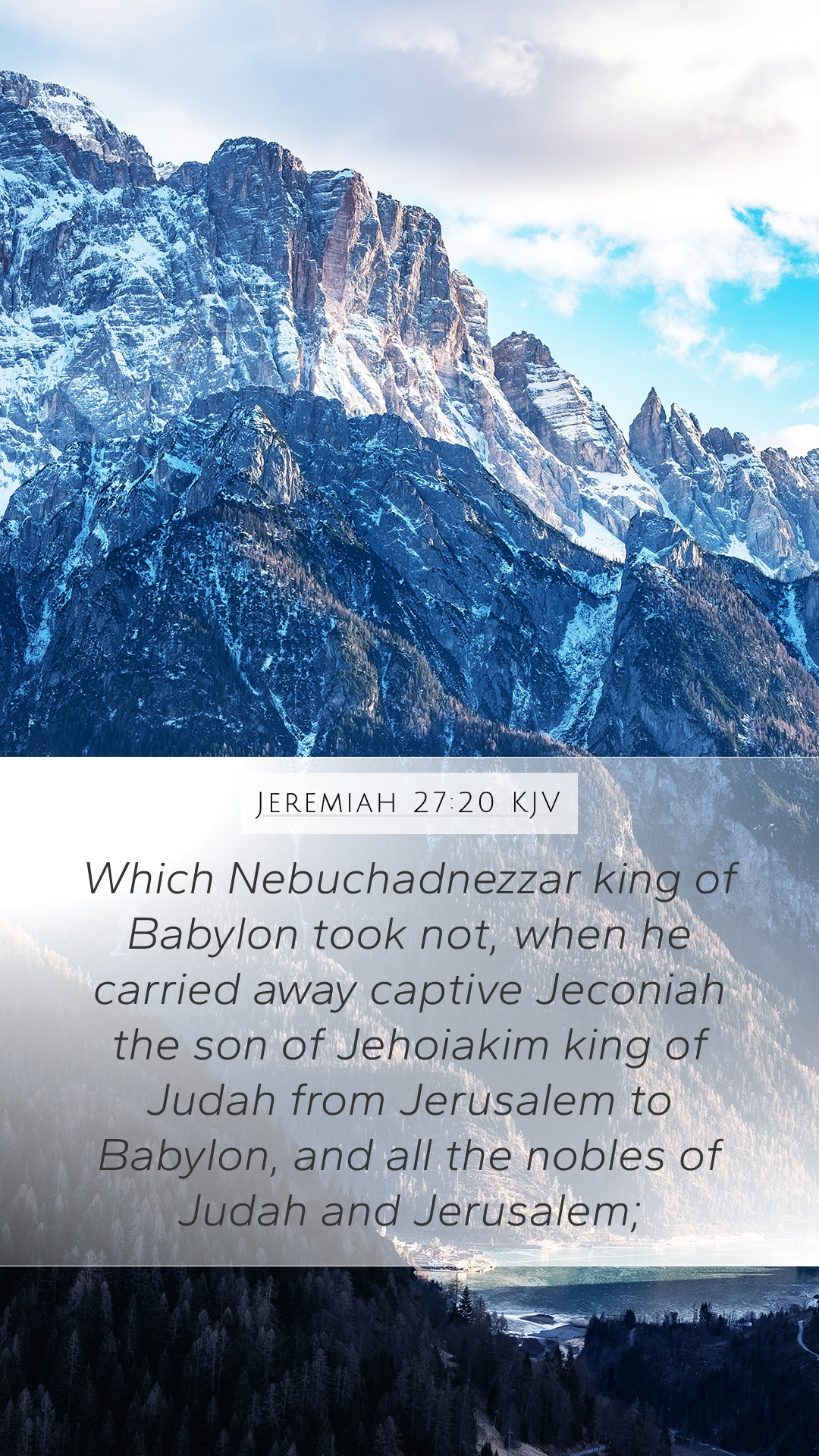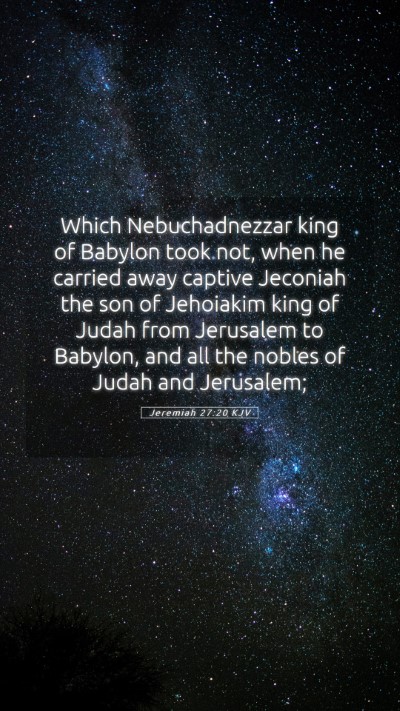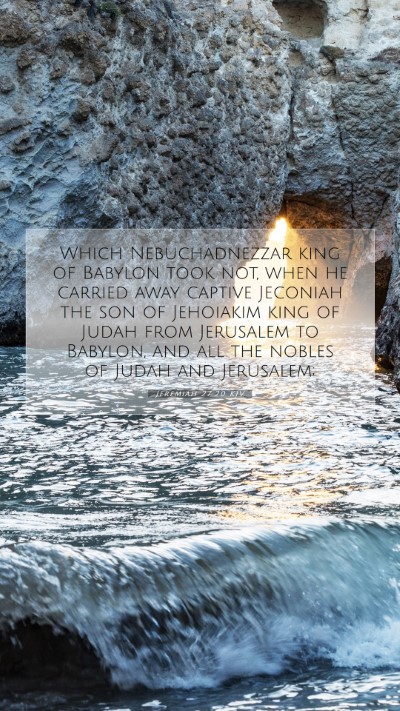Understanding Jeremiah 27:20: A Comprehensive Commentary
Bible Verse: Jeremiah 27:20
Verse Text: "Which Nebuchadnezzar king of Babylon took not, when he carried away captive Jeconiah the son of Jehoiakim king of Judah from Jerusalem to Babylon, and all the nobles of Judah and Jerusalem." (Jeremiah 27:20, KJV)
Overview of Jeremiah 27:20
Jeremiah 27:20 provides a critical insight into the events surrounding the Babylonian exile of the Jewish people. This verse references the items and individuals taken by Nebuchadnezzar during the siege of Jerusalem, highlighting the significant loss faced by the nation of Judah. The importance of understanding this verse lies in its historical context and its implications for the people of Israel and their relationship with God.
Historical Context
This verse is situated within a broader narrative of prophecy delivered by Jeremiah, who was appointed by God to forewarn the people about the impending judgment due to their unfaithfulness. The backdrop of this verse includes:
- The Babylonian captivity which began in 586 B.C.
- The fall of Jerusalem and the destruction of the temple.
- The deportation of Jeconiah and other nobles, indicating a significant shift in power and influence.
Commentary Insights
The commentaries of notable scholars such as Matthew Henry, Albert Barnes, and Adam Clarke provide profound insights into the meaning of this verse.
Matthew Henry's Commentary
Henry emphasizes the sovereign hand of God in the affairs of nations, suggesting that the captivity was a result of divine justice against the idolatrous and rebellious nature of Judah. He notes that Nebuchadnezzar’s actions were part of God's plan to purify His people. Henry further explores the loss not just of individuals but of the nation's moral and spiritual heritage.
Albert Barnes' Analysis
Barnes provides a verse-by-verse breakdown and highlights the significance of the items that were not taken by Nebuchadnezzar. He explains that these items symbolize the remnants of hope and connection to the former glory of Israel. Barnes points out that this verse serves as a reminder of God’s continuation of His promises despite the current circumstances the people find themselves in.
Adam Clarke's Exegesis
Clarke goes on to analyze the implications of this exile for the Jewish leadership. He posits that the mention of Jeconiah serves as a commentary on the instability of the monarchy in Judah. Clarke believes that this verse encapsulates both a historical account and a theological lesson on the consequences of disobedience to God’s commandments.
Spiritual and Theological Implications
Jeremiah 27:20 sheds light on key theological themes:
- Divine Sovereignty: The verse illustrates that God orchestrates the events of history in accordance with His purposes.
- Judgment and Mercy: It serves as a reminder of God’s judgment on sin, yet it also implies that there is hope for restoration.
- Exile as Purification: The exile reflects a divine strategy aimed at bringing about repentance and returning to faithfulness.
Applications for Today
Contemporary readers can glean important lessons from Jeremiah 27:20:
- The importance of remaining faithful to God, particularly in times of trial and tribulation.
- A reminder that our actions, or national behaviors, can have significant consequences.
- Understanding our historical and spiritual heritage helps us navigate contemporary challenges.
Cross References
This verse can be related to several other biblical passages that enhance its understanding:
- 2 Kings 24:14-16: Describes the deportation of the elite from Jerusalem.
- Jeremiah 25:9: Prophecy about the coming judgment from Babylon.
- Ezekiel 1:1: Shows the beginning of Ezekiel's ministry during the exile.
- Daniel 1:1-3: Discusses the selection of young nobles to be taken to Babylon.
- Lamentations 1:3: The impact of exile on the people of Jerusalem.
Conclusion
Understanding Jeremiah 27:20 requires a multifaceted approach that acknowledges historical, theological, and contemporary applications. This verse is not merely a historical account; it is a divine commentary on the nature of sin, judgment, and the hope embedded within God’s promises. Studying this verse through resources such as Bible study groups, online Bible study tools, and guided lessons can deepen one's insight into the richness of Scripture and enhance personal growth in faith.
Keywords: Bible verse meanings, Bible verse interpretations, Bible verse understanding, Bible verse explanations, Bible verse commentary, Scripture analysis, Biblical exegesis, Bible study insights, Meaning of Bible verses, Understanding Scripture.
Additional Keywords: Bible study groups, online Bible study, Bible study tools, Bible study resources, Bible study guides, Bible study lessons, Bible study topics, Bible study plans, Bible study materials, Bible study courses.
Long-Tail Keywords: How to interpret Bible verses, Understanding difficult Bible passages, In-depth Bible verse analysis, Historical context of Bible verses, Applying Bible verses to daily life, Meaning of parables in the Bible, Significance of Jesus' teachings, Old Testament prophecy interpretations, New Testament epistle explanations, Symbolism in the Book of Revelation.
User Intent Keywords: What does Jeremiah 27:20 mean, Explanation of Jeremiah 27:20, Commentary on Jeremiah 27:20, Significance of Jeremiah 27:20, Application of Jeremiah 27:20.


